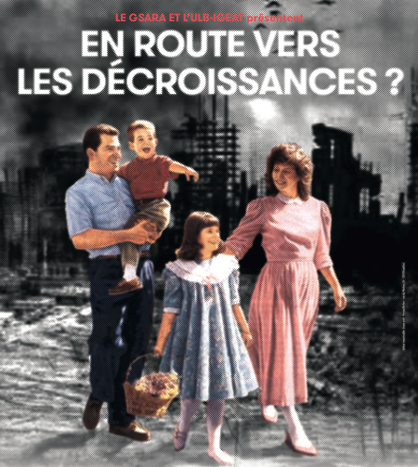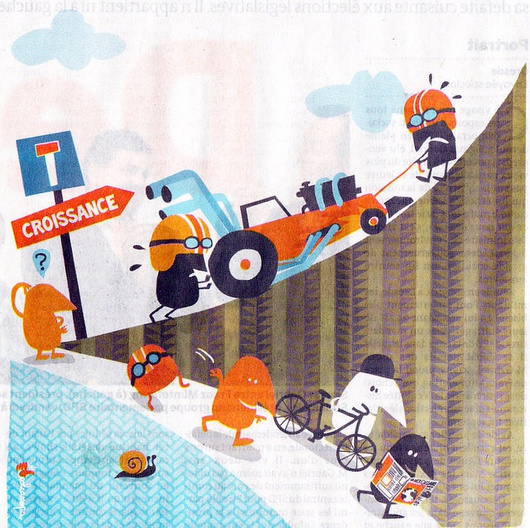
The Challenge of Degrowth: Against the Dogmas of Capital
Published on
Translation by:
Danica JordenA series of four conferences at ULB dedicated to the urgent need for sustainable economic alternatives.
If there were any benefit to the economic crisis Europe is trying to climb out of, it would undoubtedly be its contribution to questioning the economic model that until 2008 seemed to be dogma: that wellbeing was founded upon economic growth. Still a niche debate, the question has reentered discussion over the last few years because of the appearance of defects in the capitalist model as we know it, openly challenged by more and more economists. For these reasons, The Free University of Brussels (l'Université Libre de Bruxelles, ULB) has decided to dedicate a series of four conferences to the issue of degrowth. Or better degrowths given that, if the common theme is criticism of the capitalist model's long term sustainability, the voices within the degrowth movement are diverse and somewhat inconsistent. At the opening of the film “Operation Correa,” which illuminates the alternative economic solutions proposed by the president of Ecuador, the ULB's Institute for Environmental Management and Land-Use Planning (IGEAT), in collaboration with the GSARA audiovisual platform, has promoted this event to provide new impetus and visibility to an ever more passionate debate.
The Gospel of Growth
The first conference took place Thursday 6 November, led by Edgar Szoc, economist, Henri Goldman, chief editor of Politique magazine, and Jean Cornil, essayist and former Socialist deputy. By way of introduction, they presented a brief history of the concept of degrowth: the rediscovery of this alternative may be relatively recent, but its origins date to the birth of modern capitalism, as we know it today. In fact, it is closely linked to social criticisms coming out of the Industrial Revolution and its economic model, which reached its acme in today's consumer society: Growth for the sake of growth. Through this historical retrospective, it's notable that by the end of the 1800's, John Stuart Mill had already raised debate on economic growth as the ultimate goal of Western society. Moreover, the intuitive contrast between finite resources and the ambition for infinite growth was subject to criticism by the end of the 1970's, when instead the growth model seemed to be imposed, undisputed and indisputable, beyond any possibile objection. The victorious Thatcher-Reagan alliance and consequent productivity agreement would in fact lead to the marginalization of growth detractors, and the main force opposed to capitalism ended up being integrated into that. The model's hegemony became cultural and growth thereby was elevated to dogma.
Gnawing Doubts
From the time of the first indications that the game was being lost, during the early years of the 21st century, until its definitive failure with the arrival of the economic crisis in 2008, the degrowth model has slowly been emerging from the oblivion to which it had been confined. Society religiously founded upon endless growth had stopped growing, leaving the West in not only an economic crisis, but also one of morale. Faith in capital saw for the first time since the 1980's a moment in which doubt resurfaced. If the liberal compromise involving workers, unions, governments and businesses in fact consisted in the hope of the pie's constant growth, where everyone would be a winner when it was dished out, there remains not a trace of this optimism today. If the pie is no longer growing, someone will be the loser.
Rediscovering Alternatives
 But it's not only the present uncomfortable economic situation that gave new life to the idea of degrowth. A study of the change in the condition of the environment has also favoured its rebirth. The ecological catastrophe of our planet, if we do not agree again to rethink our development models, is now scientifically undeniable and foreseeable within the next generation. Nevertheless, as noted by Jean Cornil, the distance between scientific knowledge and the sphere of political decision-making today seems surreal. And something even more serious is that the point of no return is even closer. But we prefer to do nothing and continue with “business as usual,” perhaps propping up the umpteenth technological prodigy able to increase the efficiency of a car as a technological salvation. In a few words, the fact, in itself positive, that there is a new model of FIAT automobile that consumes less petrol and emits less CO2 per distance travelled, ends up being useless if the number of these cars increases, because the advantage of the new technology would only be in relative terms. In that sense, Serge Latouche, one of the most knowledgeable voices on the subject of degrowth, speaking at his own conference at the ULB in May 2013, used a particularly eloquent metaphor: "If the house is flooding and filling up with water, it's certainly good to grab mops and dry towels, but close all the faucets first."
But it's not only the present uncomfortable economic situation that gave new life to the idea of degrowth. A study of the change in the condition of the environment has also favoured its rebirth. The ecological catastrophe of our planet, if we do not agree again to rethink our development models, is now scientifically undeniable and foreseeable within the next generation. Nevertheless, as noted by Jean Cornil, the distance between scientific knowledge and the sphere of political decision-making today seems surreal. And something even more serious is that the point of no return is even closer. But we prefer to do nothing and continue with “business as usual,” perhaps propping up the umpteenth technological prodigy able to increase the efficiency of a car as a technological salvation. In a few words, the fact, in itself positive, that there is a new model of FIAT automobile that consumes less petrol and emits less CO2 per distance travelled, ends up being useless if the number of these cars increases, because the advantage of the new technology would only be in relative terms. In that sense, Serge Latouche, one of the most knowledgeable voices on the subject of degrowth, speaking at his own conference at the ULB in May 2013, used a particularly eloquent metaphor: "If the house is flooding and filling up with water, it's certainly good to grab mops and dry towels, but close all the faucets first."
Wealth is Happiness
All the inconsistency of the dominant economic model associating economic growth with happiness is revealed and brought to light by the latest, much more reliable GDP indices, such as the Human Development Index, developed by the United Nations Development Programme. The GDP in fact, too often regarded as the only measure for determining a nation's prosperity, is merely an indication of consumption, not a population's wellbeing or happiness. In fact, as illustrated by Edgar Szoc in his speech, if it's true that there is a relationship between happiness and wealth insofar as satisfying an individual's primary needs, this correlation totally disappears above a certain threshold. That is, assuming increased happiness with income growth up to 15 thousand dollars a year per capita (well below the European standard), there is no trace of correlation beyond this amount. This situation should lead to rethinking the very bases on which Western economies are constructed. Perhaps, as degrowth theorists claim, they have gone too far. Maybe, they say, we've entered a vicious circle in which satisfying one's own needs is no longer enough to be happy, given that new needs emerge to replace the old ones. Maybe the thirst for consumption that distinguishes Western society cannot be quelled.
The atmosphere was certainly not optimistic and whoever proposes certain arguments is quite conscious of the difficulties that emerge when trying to act concretely. But a wake up call is not just necessary but urgent. The time has come to rethink everything that has been taught over the last decades and propose solutions for the economic and ecological catastrophe appearing on the horizon. The theories of volontary degrowth are an alternative.
Translated from La sfida della decrescita: contro i dogmi del capitale



